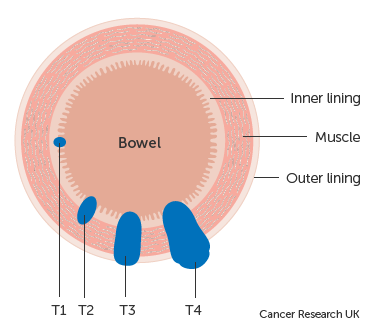In January, some of the most interesting questions on Quora, from the point of view of bowel and colon cancer patients, were:
- What are the different stages of Colon Cancer
- Can Irritable Bowel Syndrome lead to colon cancer?
- Is it true that there’s a breast, colon and stomach cancer vaccine that was developed in Venezuela?
For those that don’t know, Quora is a site where questions are asked and answered within the Quora community. It allows people with particular knowledge of a topic to answer questions specifically posed in those areas. For example, I answer a lot of questions about cancer; in actual fact, I’ve answered close to 500 questions on the topic…

What are the different stages of Colon Cancer
This is a very common question and the question of staging is something you’re likely to come across at some point during your diagnosis. There is also a question of grading, which I’ll quickly touch on before I look at the staging.
The grade of the cancer refers to how similar the cancer cells look to normal cells. It is used as a diagnostic tool in terms of the type of treatment you receive. The grades are:
- low grade (grade 1) look most like normal cells
- grade 2 look a bit like normal cells
- high grade (grade 3) look very abnormal and not like normal cells
The lower the grade, the slower the cancer is likely to be developing, which is always good news.
In terms of staging, there are three main systems in use:
The Dukes staging system has largely been replaced by the TNM staging system but I was staged in Dukes, so I thought I’d include it.
Dukes Staging
Dukes has four stages, identified by the letters A through D:
- A: The cancer is in the inner lining of the bowel. Or it is slightly growing into the muscle layer
- B: The cancer has grown through the muscle layer of the bowel
- C: The cancer has spread to at least 1 lymph node close to the bowel
- D: The cancer has spread to another part of the body, such as the liver, lungs or bones.
My cancer was staged as a Dukes C1. The ‘1’ in this instance refers to the number of lymph nodes that were involved. To be honest, I’m not sure why I was staged as a ‘C’, when it was already known that I had at least one metastasis on my liver. To my mind, this makes me very much a ‘D’. Although, thinking about it, the liver tumour had already been removed, by the time this staging was written… Maybe, with the liver metastasis resected, it could be ignored?

https://about-cancer.cancerresearchuk.org/about-cancer/bowel-cancer/stages-types-and-grades/dukes-staging
TNM Staging
This breaks the staging process down into three elements: the Tumour itself (T); the lymph Nodes involved (N), and; any Metastases involved – where the cancer has spread to other organs (M).
In terms of staging for the tumour, this relates to:
- T1 means the tumour is only in the inner layer of the bowel
- T2 means the tumour has grown into the muscle layer of the bowel wall
- T3 means the tumour has grown into the outer lining of the bowel wall
- T4 means the tumour has grown through the outer lining of the bowel wall (into another part of the bowel, a nearby organ or structure)
With the lymph nodes, which may or may not have been effected, you get:
- N0 means there are no lymph nodes containing cancer cells
- N1 means that 1 to 3 lymph nodes close to the bowel contain cancer cells
- N2 means there are cancer cells in 4 or more nearby lymph nodes
And the question of metastases is dealt with like this:
- M0 means the cancer has not spread to other organs
- M1 means the cancer has spread to other parts of the body
As such, with my diagnosis, you might expect a TNM of: T4, N1, M1.
What I actually got was: pT4b, N1 (1/25)!
This took some deciphering…
It turns out that the ‘p’ at the start relates to the fact that the tumour had been assessed pathologically. Which means that they’d checked in the Lab, and it was definitely cancer. The ‘b’, after the T4, is a sub-category of the ‘T4’ staging and just means that it’s gone to other organs. I should also point out that there are sub-categories in the ‘N’ element as well. It’s odd, though, that I was upgraded to a ‘4b’ when there is, once again, no reference to the liver metastasis that had been resected: the staging does not have an ‘M’ element at all. The N1 (1/25) simply indicates that only 1 of the 25 lymph nodes removed, was found to contain cancer.

https://about-cancer.cancerresearchuk.org/about-cancer/bowel-cancer/stages-types-and-grades/TNM-staging
Number Staging
I didn’t actually get told my result under the Number Staging, so I have no personal experience. As such, I’ll simply list what the Cancer Research UK site has to offer, which does include a useful translation into the TNM system:
“Stage 0 or carcinoma in situ (CIS)
Stage 0 or CIS means that you have an early stage of bowel cancer. There are cancer cells in your bowel lining, but they’re completely contained.
There is little risk of any cancer cells having spread.
Stage 1
Stage 1 means that the cancer has grown through the inner lining of the bowel, or into the muscle wall, but no further.
There is no cancer in the lymph nodes. In the TNM staging, this is the same as T1, N0, M0 or T2, N0, M0.
Stage 2
The cancer is localised and there is no cancer in the lymph nodes. This Stage can be divided into 2A and 2B
Stage 2A
Stage 2A means that the cancer has grown into the outer covering of the bowel. In the TNM staging, this is the same as T3, N0, M0.
Stage 2B
Stage 2B means that the cancer has grown through the outer covering of the bowel, and has spread into the tissue layer covering the organs in the tummy (abdomen).
In the TNM staging, this is the same as T4, N0, M0.
Stage 3
This stage is divided into 3A, 3B and 3C.
Stage 3A
Stage 3A means that the cancer is still in the inner layer of the bowel wall. Or has grown into the muscle layer. Between 1 to 3 nearby lymph nodes may contain cancer cells.
In the TNM staging, this is the same as T1, N1, M0 or T2, N1, M0.
Stage 3B
Stage 3B means that the cancer has grown into the outer lining of the bowel wall. Or into the surrounding body tissues or organs. Between 1 to 3 nearby lymph nodes can contain cancer cells.
In the TNM staging, this is the same as T3, N1, M0 or T4, N1, M0.
Stage 3C
Stage 3C means that the cancer can be any size. It has spread to 4 or more nearby lymph nodes. The cancer has not spread to any other part of the body.
In the TNM staging, this is the same as any T, N2, M0.
Stage 4A
Stage 4 means that the cancer has spread to other parts of the body. Such as the liver, lungs or bones.
The cancer spreads through the lymphatic system or the bloodstream. In the TNM staging, this is the same as any T, any N, M1.”
Presumably, I’d have been a Stage 4A…?
Can irritable bowel syndrome lead to colon cancer?
Irritable Bowel Syndrome (IBS) is a group of symptoms that occur without any evidence of underlying damage. Somewhere between 10 and 20% of people can expect to get diagnosed with IBS at some point.

Photo by rawpixel on Unsplash
As it stands, while the symptoms of IBS can often be confused with those of bowel cancer, there is no evidence that the one leads to the other.
So, no; IBS can’t lead to colon cancer.
IBD, on the other hand, can.
Inflammatory Bowel Disease (IBD) refers to Ulcerative Colitis and Crohn’s Disease, both of which are pretty unpleasant conditions.
Worse still, having an IBD increases your risk of developing bowel cancer by 70%.
While this sounds horrifying, it needs to be taken in context. The lifetime risk of developing bowel cancer is:
- 1 in 15, or 7%, for men
- 1 in 18, or 6%, for women
If these are increased by 70%, they become:
- 1 in 8, or 12%, for men
- 1 in 10, or 10%, for women
So, while IBS won’t lead to colon cancer, IBD might.
Is it true that there’s a breast, colon and stomach cancer vaccine that was developed in Venezuela?
Sadly not.
This seems to stem from a newspaper report from 7th June 2010 when, ‘a Venezuelan newspaper incorrectly announced the successful development by [Jacinto] Convit of a new cancer vaccine intended to prevent colon, stomach and breast cancer.’ (Wikipedia)
Jacinto Convit was a Venezuelan doctor and scientist who, in 1988, won the Nobel Prize in medicine for his work on the leprosy vaccine.

By Paulo Capiotti – https://www.flickr.com/photos/capiotti/7088669753/sizes/o/in/set-72157627378840726/, CC BY-SA 2.0, https://commons.wikimedia.org/w/index.php?curid=20228597
He was also well known for his studies and efforts to treat cancer. He died in May 2014 at the age of 100.
After the newspaper report was published, ‘Venezuela’s National Institute of Biomedicine soon published a note clarifying that they have been working for the previous three years on a vaccine against cancer and it is still in development.’ (ibid, Wikipedia)
As yet, this work is still in development.
And that’s it from Quora for January, hopefully these questions have been sufficiently interesting. Should anyone wish to read my answers on Quora, they can be found here.
